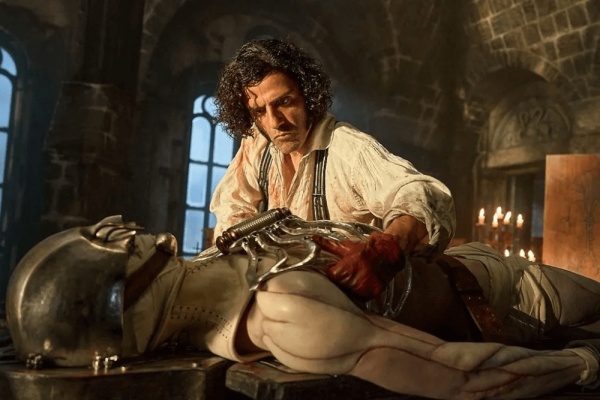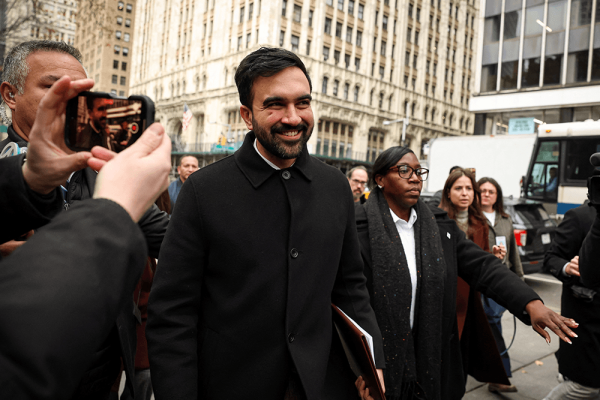In 2018, blockbuster guru James Cameron hosted a fascinating conversation with Star Wars creator George Lucas. While discussing the original trilogy for Cameron’s Story of Science Fiction series, the conversation turned to war and resistance. Cameron observes that the Rebel Alliance is not playing by any accepted mainstream definition of heroism.
CAMERON: The good guys are the rebels. They’re using asymmetric warfare against a highly organized empire. I think we call those guys terrorists today. We call them Mujahideen. We call them al Qaeda.
LUCAS: When I did it, they were called Viet Cong.
CAMERON: Exactly. So were you thinking of that at the time?
LUCAS: Yes.
Money, ubiquity, and familiarity have blunted the radical force of Lucas’ original vision, so much so that it’s not unusual to see nostalgia-poisoned fans wistfully recalling his original trilogy as a time before “everything got so political.” But Cameron, always a fine student of sci-fi politics, notes that not only were Luke, Leia, and Han taking part in an explicitly political drama; they were fighting on the side most of the viewing public — at least in modern Western politics — would consider “the bad guys.”
CAMERON: [I]f you look at the inception of [the United States of America], it’s a very noble fight. You look at the situation now, where America’s so proud of being the biggest economy and most powerful military force on the planet: It’s become the Empire!”
LUCAS: It was the Empire during the Vietnam War. But we never learned from England or Rome or a dozen other empires that went on for hundreds of years, or sometimes thousands of years. We never got it.
Star Wars fans are not inclined to see themselves as the Storm Troopers any more than Christian readers of the New Testament are inclined to see themselves as the Romans. It would take a pretty dramatic and radical type of Star Wars story to resituate the whole galactic conflict within a political framework that snapped Lucas’ original vision back into focus. It would take something like Andor. The second season, which is releasing in three-episode batches on Disney+, is one of the better TV shows of any genre so far this year.
Andor, Tony Gilroy’s prequel series leading up to the events of Rogue One, is a Star Wars story about the people who would be background extras in other Star Wars stories. There are no chosen ones bringing balance to the Force or deposed princesses being rescued by New Hopes. There are only ordinary people struggling to live, love, fight, and die with some dignity beneath an authoritarian shadow.
Take the show’s namesake Cassian Andor (a gripping, locked-in Diego Luna), who has spent the better part of his life cautiously tiptoeing around Imperial rule until circumstances drag him into the thick of the fledgling fight. He is not a revolutionary like Saw Gerrera (Forest Whitaker) or a disaffected elite like Mon Mothma (Genevieve O’Reilly). He’s just a guy who becomes surrounded by men and women who’ve devoted themselves to desperate, scrambling efforts to do some sort of damage to the Empire, and decides to start doing his own part to gum up the cogs of the Imperial machine.
And it is a machine. Andor’s Empire is a long way down from the space magic and planet explosions familiar to all. At this show’s ground level, the Empire does not need the Force to choke the life out of you. The first episode of Season 2 boldly devotes nearly a third of its running time to an Empire boardroom meeting, where Imperial director Orson Krennic (Ben Mendelsohn) discusses a heady plan for galactic energy independence that is clearly a thin pretext for further authoritarian overreach. This Empire runs on bureaucracy, veiled threats, and countless low-level cogs who are just doing their jobs. All this gives Andor something Star Wars hasn’t had in ages: timeliness.
Lucas himself made attempts to go here in his prequel trilogy, which was dinged by fans and critics alike for spending too much time on political discourse around trade routes, exploring how a nascent Empire topped the democratic order by smuggling fascist rule in through populist economic policy. Read basically any headline in the United States right now and you’ll be forced to admit that Lucas was downright prophetic here, even if it all ended up being very boring to watch. But that might have been part of the point: The collapse of democracies is often boring.
Admit it. Didn’t you think fascism would feel different? That it would explode onto the scene rather than creep in through bureaucratic channels? It has been one of the strangest features of the last few months of Trump’s second term, a term that has been marked by lawlessness and defiance of the constitutional order. As I write this, there are men and women rotting in jails who’ve committed no crime except holding opinions the government doesn’t like. Immigration and Customs Enforcement has detained college students on the street, fathers in their cars, and children too young to know what’s going on. There’s at least one man who seems to have disappeared entirely. The Supreme Court has ordered the executive branch to outline steps for its plans to return a man ICE accidentally threw into an El Salvador prison, and that order seems to be collecting dust. Several judges have been arrested by police, while our self-proclaimed president-king, having already tried to defy the results of one election, is now bragging about winning the next — an election in which he is not legally allowed to participate. If this is not authoritarianism, what would authoritarianism look like? And yet the processes that got us here — a series of below-the-fold policy decisions, conservative radicalization, liberal capitulation, dark money transfers, and manufactured moral panics — failed to arrest the attention of the mainstream voting public until it was too late.
And how goes the struggle against this clear and present threat to democracy? Most of us are just trying to keep our heads down and get by, which is easier for some than others. We’re scared and upset, sure, but what are we really supposed to do? It turns out that for people of certain means, life under authoritarianism can kind of, sort of, go on. As Luke Skywalker himself would “later” whine to Obi-Wan Kenobi in A New Hope: “It’s not that I like the Empire, I hate it. But there’s nothing I can do about it right now.”
But that doesn’t really sit right, so some of us get involved with local resistance efforts, throwing our time and resources toward protecting immigrants, defending the rights of transgender kids, and shoring up voting rights in our communities. But the more involved you get, the more it seems like these efforts are a waste of time. The work is small potatoes, dull, and doesn’t seem to have much of an impact. And any time there is some sort of attempt at bold, defiant action, it gets hobbled by pesky infighting.
Andor is keenly aware of all this, and for every daring daylight raid on an Imperial outpost, there are three scenes in which our “heroes” are frustrated by their own lack of organization, resources, or unified front. When Cassian finds himself stranded amid an unfamiliar and hostile resistance group, he tries to assure them that he’s for the Rebellion.
“Whose rebellion?” they spit back, right before falling prey to their own factions. Leftist infighting, it seems, is a constant in any galaxy.
And there’s an astounding sequence when Mon, faced with mounting threats on all sides of her clandestine attempts to aid the burgeoning Rebellion, all but disassociates at her daughter’s arranged wedding. Knocking back a few drinks, hitting the dance floor, and losing yourself in a desperate bid for joy might be familiar to anyone who’s ever found themselves so paralyzed by this administration’s actions that escapism felt like the only option available.
This is all a long way of saying that Andor understands that resistance is hard, messy, boring, and comes with as many irritating setbacks as it does great personal risks. Very few of us will get to be Han Solo shaking off TIE Fighters or Kylo Ren bisecting Supreme Leader Snoke with a lightsaber. But you don’t get those moments without the frustrating work of building an alliance. In Andor, Cassian, Mon, Luthen (Stellan Skarsgård), and the rest are trying to organize a rebellion — and find that doing so sucks. But then, the only thing worse than fighting fascism is accepting it.
Got something to say about what you're reading? We value your feedback!







